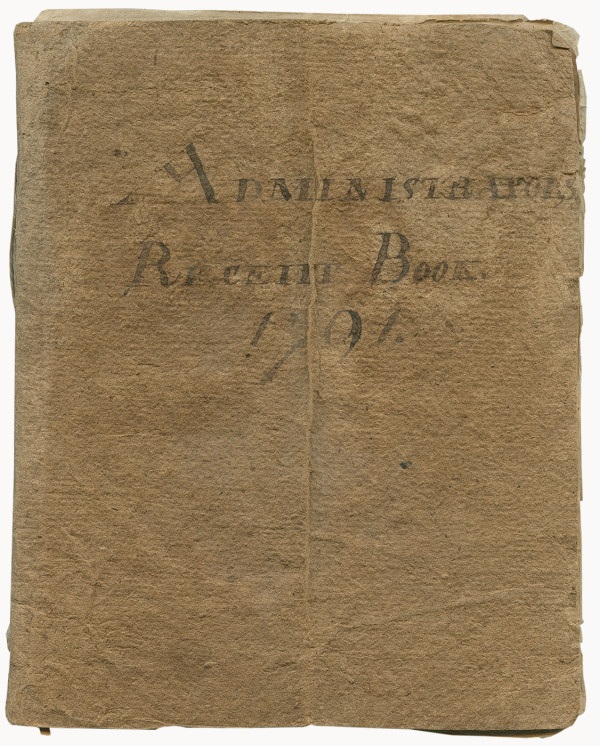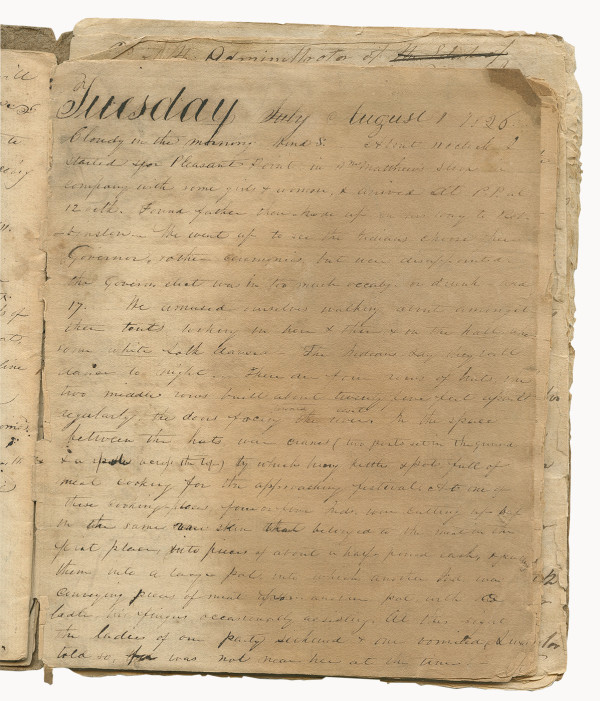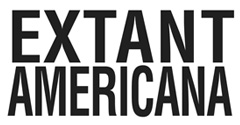
(Early Eastport, Maine) Manuscript diary, 40 leaves (approx 70 pages Ms.) 220 x 170 mm. Eastport, Maine 1 June to 7 September 1826 (with several entries in another hand dating between 1791 and 1824). A brief, but eventful diary kept by an unidentified journalist that features an evocative description on an Indian reservation at Pleasant Point. The diary also describes 4th of July festivities in the town, popular reaction to the deaths of John Adams and Thomas Jefferson as well as a visit of an itinerant preacher who was essentially laughed out of town.
On 18 June 1826, our diarist described what would appear to be the arrival of regular steamer service to the region: “…Father is to come in on the S.B. St. John, which is to sail regularly as follows: ‘To leave Eastport for St. John every friday, St. John for Annapolis every Saturday, returning to St. John every Monday & thence to Eastport every Tuesday.” The same day he described the arrival of “the U.S. Sloop of War Lexington 24 guns … a curiosity to us being the only American Ship that has arrived in this Port for ten years or more. She is to stop only a few days so she cannot stop till the 4th of July …”
“Friday, July 7th 1826 … Night before last a man calling himself Daniel Martin & saying that he was from the town of Pelham in Canada, near Niagara Falls undertook to hold forth to the people, in the Free Will Baptist church. As his appearance was rather singular the meeting house was crowded. He is tall & bends forward, – dressed in a light brown coat with a straw hat in the shape of a bowl, his beard two or three inches long, – face rather pale. His text was in the old Testament something about a white stone, & in the stone a Seal &c. His language English was very incorrect, vulgar using, for instance, the word ‘was’ in the place of ‘were,’ continually. – Before he named his text he made a few observations, rather incoherently mentioned told who he was &c; before he had finished this many went out. When he first began to speak he appeared to have an impediment in his speech & distress at his lungs, but has he grew more earnest he talked spoke more freely. He had talked about half an hour, when the audience appeared to be much dissatisfied a great many going out – at last when he saw nearly all the people in the body pews, pressing towards the door, some laughing out loud … he sat down. When Mr. Holman who was in the pulpit with him got up & said that he had requested the preacher to stop. After a few observations he went on with the sermon himself, the people quiet. He spoke a few minutes prayed & Then left the meeting. Martin got up again & began to preach the gospel to those who had crowded up the aisles, with their hats on talking out loud laughing &c. Then ensued a scene as I never witnessed a place of worship before, &c much merriment. Our fellow (standing near Re Mr Ford) said ‘We have a subscription, a four-pence a piece, to get his beard shaved? This he said out loud. At length Mr. Peavey came and went up to the pulpit & told the clergymen to stop, then turned to the audience & said ‘this mouse is mine: those who wish to go may go & then you (turning to Martin) may speak all night if you wish to.’ Mr Martin went out the people after him, joking him & laughing. He went down Washington Street at the head of the procession & requested a night’s lodging at Mr Lee’s house. After some knocking some time He came out, in his shirt & admitted him. Mr. Trask becoming sentry for Martin. While coming down the street a gentleman (so reputed at least) trailed[?] up alongside the discomforted[?] preacher, & requested him, repeatedly to ‘finish that story he was telling.’ ‘Come, finish that story. it was a very pretty one, i should like to hear the rest of it.’” H.H. – Mr Martin went in the sarah[?] this morning.”

“Monday July 10th 1826 … We learn the deaths of John Adams, late President, & father to the present President. He died 4th inst. hearing the Salutes he inquired the occasion, & being told that it was the 4th July said,’it was a great & glorious day,’ and never spoke more… Thus, one of our the Revolutionary Patriots,, & soon there will be done who can relate the Tears of our Revolution, to which they have been eyewitnesses. Fifty years ago, they were in life & vigour, honoured & respected by those whom they had made free, smiling complacently upon their ‘handy work,’ looking forward to an honuorable old age & expecting to go down to the grave gently & in peace, but now ‘where are they?’ their laurels have faded, their glory departed. they all will soon be forgotten, all but a few, whose memory cannot be forgot so long as the United States continue to be United States. Washington the Father, Savior of the country will always be remembered with the feelings worthy his greatness…”
“Friday [June] 14th 1826 … The S. B. Patent [sic packet?] arrived this afternoon 40 passengers … By her we receive news of he death of Thomas Jefferson, who died on the 4th inst. about 1 o’clock the same hour that the Dec. Indp was ‘promulged’ in Congress”.
“Tuesday July 25th 1826 … Guns have been firing from the fort ever since day light & the flags of all the Am Vessels in the harbour ‘half-masted’ as mourning for John Adams & Thos Jefferson.”
“Sunday [July] 30th 1826 … Mr Merriam preached a funeral sermon for Adams & Jefferson. The fist part thought good, but he made it immoderately long & tedious…”
“Tuesday August 1 1826 … started for Pleasant Point in Wm Matthews sloop … found father there then rode up on his way to Robinston – We went up to see the Indians choose their Governor, & other ceremonies but were disappointed the Govr. elect was in too much [?] or drunk… We amused ourselves walking about amongst the tents looking in them & there & in the hall where some where Salk danced — The Indians say they would dance to night – There are four rows of huts, the two middle rows built about twenty-five feet apart regularly, the doors facing toward the river. In the space between the huts are cranes (two posts set in the ground & a spike across the top) to which hand kettles & pots full of meat cooking for the approaching festival. At one of those cooking-places, four or five Ind’s. were cutting up beef in the same raw skin that belonged to the meat in the first place into pieces of about a half pound each, & putting them into a large pots, into which another Ind. was conveying pieces of meat from another pot, with a ladle his fingers occasionally assisting. At this sight the ladies of our party sickened & one vomited, I was told so, for was not near her at the time – about 3 o’clk w went to Deacon Socabeson’s house & partook of a mess, which could not with propriety be called supper – or dinner, but was a compound of both … our fair hostess (the deacon’s squaw) took the bowl off telling us that she had given fifty cents for two $2. The house a small two rooms & a kitchen … altogether better finished than the houses of the middle class of white people – On the mouth piece I saw a short containing an account for the Indians in the U. States & some others Ch no. of St. John’s tribe was stated 300. the Passamaquiddin 379 with the Penobscot nearly 300 — Their huts are built very neatly of boards & slabs from thatched with brushbark[?] … Nearly all the Indians were in their huts, some drunk, We saw only one at work, under a cover making timbers for a canoe. I understood that this man was at work because opposed to the [?] of the destined governor, whereas all his partisans were today on holiday. Mr Kellogen told us that he is not elected unless the votes be unanimous & that the minority generally gave up & concur with the majority. They have a small, but good school house where we found Mr. Kellogen with three of the St John tribe learning to read — syllabus of their letters… Mr K. had a number of primer books on his desk. His master & scholars each take a book with a straw a stick to ‘keep the place’ & they pronounce each letter after him. He said it was difficult for them to pronounce and with consonants their language abounding in vowels. He could not command them but was obliged to goat them along…”
The last several pages of the diary are used for the journal’s original intent as an “Administration Receipt Book” chronicling transactions of an estate administrator in Gloucester, Massachusetts from 1791 to 1824.
Pages unevenly toned, many loose from binding, usual folds and marginal chips.
(EXA 3554) SOLD
